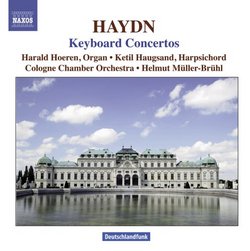| All Artists: Franz Joseph Haydn, Helmut Müller-Brühl, Ketil Haugsand, Cologne Chamber Orchestra, Harald Hoeren Title: Haydn: Keyboard Concertos Members Wishing: 0 Total Copies: 0 Label: Naxos Original Release Date: 1/1/2008 Re-Release Date: 12/16/2008 Genre: Classical Styles: Chamber Music, Forms & Genres, Concertos, Historical Periods, Classical (c.1770-1830) Number of Discs: 1 SwapaCD Credits: 1 UPC: 747313048670 |
Search - Franz Joseph Haydn, Helmut Müller-Brühl, Ketil Haugsand :: Haydn: Keyboard Concertos
 | Franz Joseph Haydn, Helmut Müller-Brühl, Ketil Haugsand Haydn: Keyboard Concertos Genre: Classical |
Larger Image |
CD Details |
CD ReviewsHaydn's Salad Days Robin Friedman | Washington, D.C. United States | 10/26/2009 (4 out of 5 stars) "When most music lovers think of Haydn (1732 - 1809), they remember some of the music he composed in the service of the Esterhazy family beginning in 1761. Prior to that time, between 1758 - 1761, Haydn had held a similar post as the music director and court composer for Count Morzin. Before 1758, Haydn lived the uncertain life of a freelance musician and composer in Vienna. Although he struggled with poverty as a young composer during these years, Haydn's works clearly brought him attention and respect from high places. Unfortunately, it is rare to hear any of the music Haydn composed during these, his salad days. Some of these early works, consisting of concertos composed for organ or harpsichord, are included on this CD of Haydn concertos performed by Helmut Muller-Bruhl and the Cologne Chamber Orchestra together with Harald Hoern, organ and Ketil Haugsand, harpsichord. The disk was released as a single CD in 2008, and it is also available as part of a 6 CD set on Naxos of the complete Haydn concertos with Muller-Bruhl and his orchestra.
The five concertos on this CD were likely composed between 1752 and 1755 when Haydn was in his early 20s. They are denominated as "keyboard" concertos without specifying between the organ or the harpsichord. It is likely that the concertos were originally intended for performance during interludes in church services. They are not concertos in the modern sense. The works seem on the cusp between the Baroque and early classical styles and are more in the nature of ensemble pieces than classical concertos. The works were composed for an instrument of limited range (they do not make use of the pedals of the organ) featuring the higher register of the keyboard. The solo material is generally given to the right hand while the left hand part duplicates the orchestral accompaniment or consists of simple chords. Still, these works are engaging and melodious and well-constructed. For the most part, they are recognizably Haydn in spirit and invention. Of the five works here, three are performed on organ and two on harpsichord. The lengthiest and most representative of these works is the first, the concerto in C major, Hob. XVIII:1. (Of these five concertos, four are in C major with the remaining concerto in F major.) This work remained important for Haydn throughout his life. It was performed in church services in 1756 to celebrate Theresa Keller's acceptance as a nun. Theresa Keller would become Haydn's sister-in-law. Haydn had been deeply in love with Theresa and was surely heartbroken when her parents insisted that she enter a convent. In 1760, Haydn married Theresa's older sister, Maria Anna. The marriage proved unhappy for both parties. But the C major concerto does not evidence Haydn's heartbreak. The work is festive in tone with fanfare for both the keyboard and the, considering the time period, large orchestral ensemble in both the outer movements with a serene and flowing Largo for the middle movement. The remaining four concertos are also festive and ceremonial in tone, with rapid runs and ornamentations that may be more suited to the harpsichord than to the organ. The C major concerto, XVIII:5, performed on the harpsichord, and the C major concerto Hob; VIII:10, performed on the organ, both feature lovely and highly embellished slow movements. Beyond a handful of symphonies, string quartets, and oratorios, Haydn remains too-little known. This CD offers an opportunity to hear some of the earliest works of this inexhaustible composer. Robin Friedman" |
